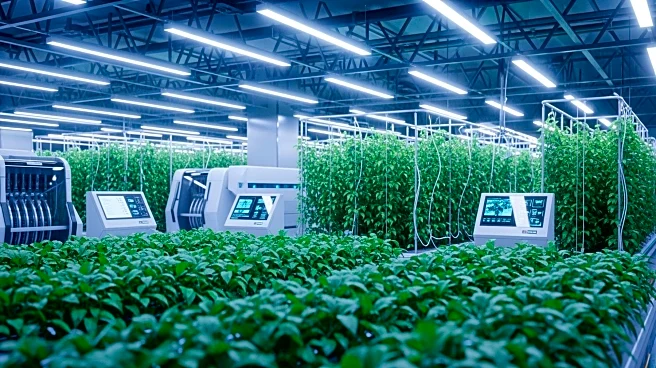What's Happening?
The agricultural inoculants market is projected to experience significant growth from 2025 to 2032, driven by increasing demands for sustainable agricultural practices and technological advancements. Agricultural inoculants, which enhance microbial activity
in soil and plant systems, are crucial for improving nutrient availability and boosting crop yields. As global population growth continues, the need for efficient farming practices is amplifying, solidifying the importance of inoculants in modern agriculture. The market is expected to evolve with a compound annual growth rate (CAGR) of 0.67%, influenced by innovations such as biostimulants and precision agriculture. Farmers are increasingly adopting these technologies to address environmental challenges and enhance productivity, positioning the agricultural inoculants market as a key player in meeting future food demands and fostering economic development within the agricultural sector.
Why It's Important?
The growth of the agricultural inoculants market is significant for several reasons. It reflects a broader shift towards sustainable agriculture, driven by concerns over the environmental impact of chemical fertilizers and pesticides. This shift is encouraging farmers to adopt natural solutions that improve soil fertility and crop yields without harmful side effects. Technological advancements in biotechnology, including genetically modified organisms and advanced microbial inoculants, are enhancing the performance and acceptance of these products among farmers. Government regulations and support, such as subsidies and agricultural grants, are promoting the use of bio-based products, further increasing the uptake of inoculants. As awareness and education about the benefits of inoculants grow, demand is expected to rise, contributing to market expansion and supporting the global trend towards organic farming.
What's Next?
The agricultural inoculants market is poised to continue its growth trajectory, driven by emerging trends such as the use of microbial inoculants, integration with biostimulants, and the adoption of digital agriculture tools. Enhanced product formulations that improve shelf life and effectiveness under various environmental conditions are expected to make inoculants more appealing to a wider audience. As the industry adapts to changing agricultural practices and consumer demands, it will likely enhance the reach and efficacy of agricultural inoculants, fostering resilience in the market. Key players in the market, including Bayer, BASF, and Novozymes, are investing in research and development and forming partnerships to leverage sustainable practices, aligning their strategies with trends toward organic and regenerative agriculture.
Beyond the Headlines
The agricultural inoculants market is not only about enhancing crop productivity but also about addressing broader environmental and economic challenges. The shift towards sustainable and organic farming practices is driven by consumer demand for healthier food options, which is leading to increased incorporation of biological products that enhance soil health and crop yields. The rise of precision agriculture presents opportunities for companies to leverage data-driven approaches to optimize product efficacy. As sustainable practices gain traction, particularly in developing regions, companies are compelled to pivot towards eco-friendly solutions to maintain a competitive edge. This market evolution reflects a growing awareness of the need for environmentally responsible farming practices that can support global food security and economic stability.















